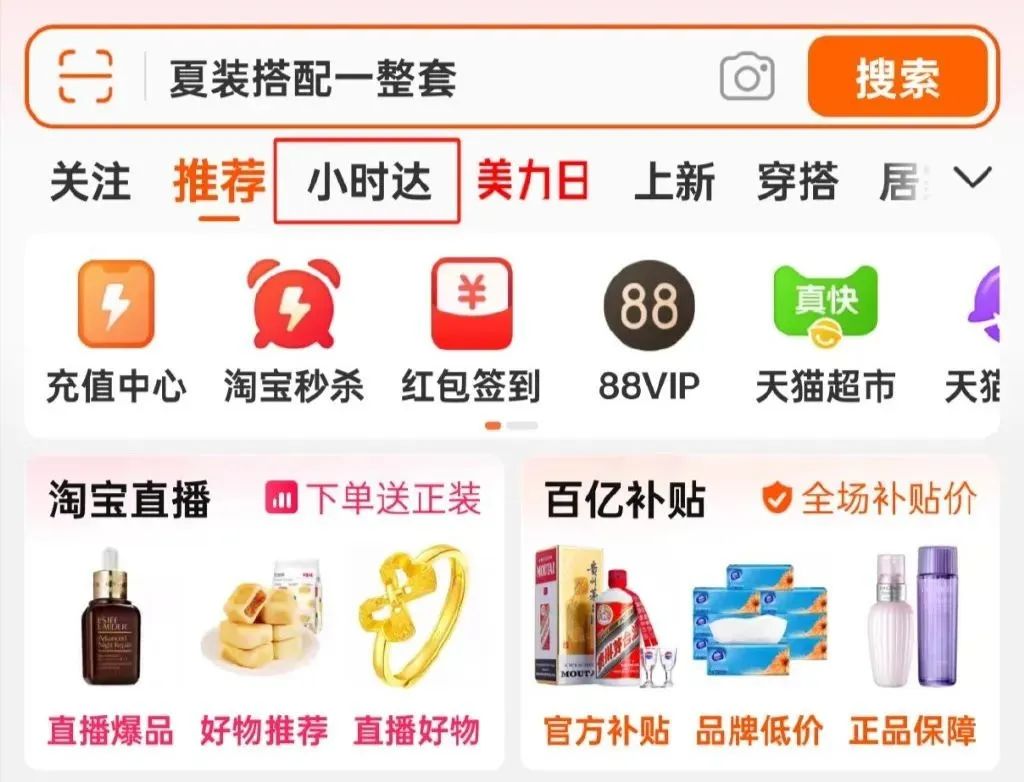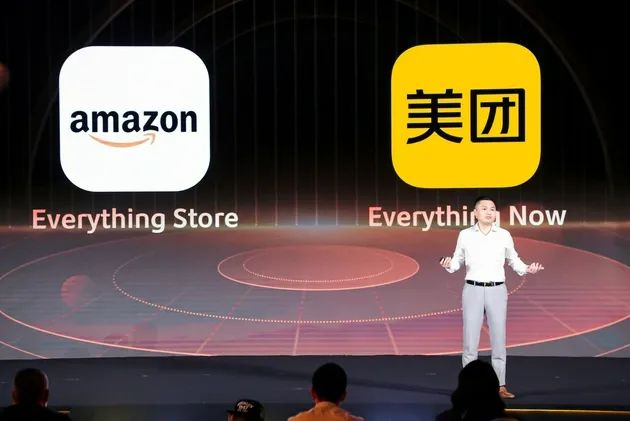Meituan's Territory Being Threatened by Big Tech Companies
![]() 08/26 2024
08/26 2024
![]() 432
432

Meituan is using its lifeline to compete against the second curve of big tech companies.
After the "golden age" of China's Internet industry has passed, big tech companies have turned their attention to exploring new avenues. Over the years, they have tasted the bittersweet flavors of To B, metaverse, live streaming e-commerce, and more. Looking back now, it seems that the local lifestyle services sector, once thought to be settled, has emerged as a shining star among the rest.
During Alibaba's earnings call after releasing its fiscal Q1 2025 results, CFO Xu Hong revealed in the Q&A session, "For local lifestyle services, we need to increase scale and order volume while improving the unit economics model (UE)." This comment was in response to a question about when Alibaba's loss-making local lifestyle businesses would achieve profitability. Clearly, Alibaba's core management team is confident in its local lifestyle segment, represented by Ele.me and Amap, at least for the next one to two years.
In the e-commerce sector, Taobao recently added an "hour-long delivery" feature as a primary traffic entry point on its homepage, leveraging Ele.me's delivery system. JD.com also shares this vision, having integrated its past "hour-long delivery" and "JD.com Home Delivery" services into "JD.com Express Delivery" in May this year, and allocated a primary traffic entry point on the top right of its app's homepage. The instant retailing sector, which has caught the attention of e-commerce giants, inherently falls under the purview of local lifestyle services.

Image source: Taobao
Similarly, Tencent's WeChat Video launched a policy for local lifestyle merchants to join its platform in late April this year, covering two primary categories (food and beverage, and travel), as well as nine secondary categories (such as dine-in, fast food, bakery snacks, accommodations, and scenic spots). It also offered discounted technical service fees, demonstrating its commitment to this sector.
As Meituan, the acknowledged leader in local lifestyle services, grapples with the formidable challenge posed by TikTok, giants like Alibaba, JD.com, and Tencent, as well as upstarts like Pinduoduo, Kuaishou, and Xiaohongshu, seem to have smelled an opportunity. They are either doubling down on their efforts or entering the fray for the first time. After the frenzy of community group buying, the local lifestyle battleground has once again ignited.
01 The Local Lifestyle Sector Holds Great Potential

The competition is driven by the pursuit of profits. The local lifestyle sector has gained the attention of big tech companies after various failed forays, and for good reason.
On a macro level, the National Bureau of Statistics has announced that it will start publishing monthly cumulative growth rates of service retail sales from August this year. According to official data, service consumption accounts for over 40% of per capita consumption expenditure nationwide.
Third-party research firm QuestMobile found that, as of April 2023, the online penetration rate of the local lifestyle services sector reached 38.4%, with food delivery services accounting for 15.6% of that. Considering that even the comprehensive services sector (primarily group buying) has a penetration rate of less than 40%, there is still significant room for growth in the local lifestyle sector. According to iResearch, the domestic local lifestyle services market is expected to nearly double by 2025, reaching 35.3 trillion yuan, compared to 2020.

On a micro level, players already in the game have discovered the gold mine. According to financial reports, Meituan, the leader in the local lifestyle sector, generated a total revenue of 206.9 billion yuan in 2023, a year-on-year increase of 28.7%. Its primary businesses of local commercial commissions and online marketing grew by 35.3% and 31.2%, respectively, with operating profit up 31.2% year-on-year.
As a newcomer, ByteDance's local lifestyle segment has not disclosed financial data. However, based on information from the Giant Engine City Research Institute, TikTok's local lifestyle gross merchandise volume (GMV) grew by 256% as of November 15, 2023, with food and beverage GMV up 191%, comprehensive on-site GMV up 330%, and travel GMV surging by 435%.
Both macro and micro data point to the high growth potential and market potential of the local lifestyle sector. In contrast, the "2023 China E-commerce Market Data Report" shows that China's e-commerce market reached 50.57 trillion yuan in 2023, a year-on-year growth of just 6.31%.
The preparations made by these giants are evident in the predictive judgments of their leaders.
According to media reports, ByteDance's internal management team reflected in late 2019 that TikTok should return to its product positioning of connecting people with services, not just information and individuals. Zhang Yiming subsequently proposed going "deep" into catering, shopping, and travel. TikTok's subsequent aggressive push into local lifestyle services once caught Meituan off guard.
Ele.me, which lost the food delivery battle to Meituan, was acquired by Alibaba and integrated with Koubei, Amap, and Fliggy under the leadership of Yu Yongfu, an Alibaba partner. In 2022, Yu stated in an internal letter that while the competition was not intense (due to the limited number of players), it was brutal (a long-term boxing match with no clear winning strategy), emphasizing the importance of fundamental capabilities. Clearly, Alibaba is preparing for a prolonged battle in the local lifestyle sector.
02 Responding to Both Home Delivery and On-Site Services

One notable change brought about by the Internet to physical business activities is the separation of transactions and delivery. Based on delivery locations, local lifestyle services can be divided into two main categories: home delivery and on-site services.
Today's popular local lifestyle services sector originated over a decade ago as group-buying websites, a fashionable O2O (Online To Offline) business model at the time. Consumers were grouped together online to form a "collective purchasing" group, negotiating discounts with merchants based on volume. Transactions were completed online, but services were delivered offline, hence the term "on-site services."
Meituan emerged victorious from the "Thousand Group Wars" and solidified its position as a leader in local lifestyle services through the food delivery wars. The catering industry, due to the unique nature of its goods and services, lends itself well to home delivery. The logic of on-site services was then applied to home delivery. With the rise of community group buying, e-commerce platforms have evolved concepts such as near-field e-commerce and instant retailing. Home delivery can be further subdivided into categories such as community delivery and doorstep delivery. However, the defining characteristic of home delivery is that the delivery location is closer to the buyer than the seller.

Over the years, Meituan's home delivery business, centered on food delivery and logistics, has generated traffic, while its on-site services business, primarily catering and travel, has generated profits, completing a business loop. However, in April this year, founder Wang Xing announced in an internal email that Meituan would "no longer have separate Home Delivery and On-Site Services business groups; instead, all departments under these groups will report directly to 'Core Local Commerce.'"
By consolidating its efforts, Meituan is both defending and attacking, aiming to cope with increasing external competition. Among the surrounding competitors, Alibaba boasts both an on-site services segment centered on Amap and a home delivery segment encompassing Ele.me and instant retailing. E-commerce platforms like JD.com and Pinduoduo leverage their well-established logistics capabilities to enter the home delivery market, while content-driven platforms like TikTok, Kuaishou, WeChat Video, and Xiaohongshu focus on attracting local lifestyle merchants and facilitating on-site services.
Previously, Pu Yanzi, head of TikTok's commercialization, internally assessed that "on-site services are our ongoing investment in lifestyle services, while home delivery, if simply replicating traditional delivery models, is unlikely to bring incremental growth or business changes to the industry." This attitude clearly reflects the differing progress of TikTok's local lifestyle services in on-site and home delivery.
The new and old forces eyeing Meituan's territory are no longer relying on big-budget campaigns funded by early-stage capital. Instead, they are leveraging their respective resources to gradually erode Meituan's long-established market share. While defending its core high-frequency to low-frequency business model, Meituan is also learning from its competitors. Pinduoduo's ultra-low pricing strategy has inspired Meituan's "Pin Hao Fan" (group meal deals), while live streaming and short videos now occupy prominent positions on Meituan's homepage, creating a tense battleground in both on-site and home delivery segments.
03 The Key to Victory Lies in Incremental Competition

This is a battle that big tech companies must fight, and one that Meituan cannot afford to lose.
Meituan, a survivor of the brutal group-buying wars, has triumphed numerous times. Its former rival, Baidu Waimai's former CEO Wang Puchong, was even recruited to become the CEO of Meituan's Core Local Commerce division. Ele.me, which predates Meituan's food delivery service by five years, has been overtaken and suppressed. Even TikTok, with its formidable short video traffic, has made significant inroads into local lifestyle services without seriously denting Meituan's core business.
However, the outcome of this battle remains uncertain. For both e-commerce and content platforms, their involvement in local lifestyle services represents an extension of their core businesses.
For example, for Taobao and JD.com, their traditional C2C and B2C e-commerce businesses are developing steadily. Their foray into instant retailing in local lifestyle services is merely an exploration of a second or third growth curve. Similarly, for content platforms like TikTok, Kuaishou, Xiaohongshu, and WeChat Video, monetizing content traffic is not limited to a single approach. On-site services in local lifestyle represent another avenue for commercialization, in addition to information stream advertising and live streaming e-commerce.
In contrast, local lifestyle services are akin to Meituan's lifeline. While competitors can claim victories by infiltrating even a single aspect of Meituan's business, a double win would be even sweeter. While Meituan's morale is high, a defeat would carry greater risks.
Meituan's recent restructuring is an attempt to break free from its traditional traffic-and-profit model, opting instead for a dual-track approach. Wang Puchong believes that the retail market is transitioning from a "store of everything" to an "everything delivered to your doorstep" era, with the instant retail market poised to reach trillions in size within five years. Meituan's home delivery business cannot merely serve as a traffic generator; it may even compete with on-site services for profit margins in the future.

Crucially, while no one denies the bright prospects of the local lifestyle sector, the volatile consumer environment makes this future-focused battle an intense incremental competition.
Content platforms have traffic advantages in untapped markets with low penetration rates, while e-commerce platforms excel in high-tier markets with well-established logistics networks and merchant ecosystems. Both sides have transparent strategies that Meituan can easily replicate.
With the initial advantages in supply and demand quickly disappearing, the key factor in this retail and service market competition is trust accumulation. This translates to specific metrics like fulfillment rates for home delivery, redemption rates for on-site services, and repeat purchase rates for consumer spending.
Unlike the largely one-time travel spending in the travel segment of on-site services, home delivery scenarios, including instant retail, are often habitual and close to consumers. Once consumers form habitual perceptions based on products or services offered by platforms and merchants, it directly influences subsequent spending decisions. With Dianping under its belt, Meituan should be well-versed in this aspect.
Whether it's Meituan, Alibaba, JD.com, Tencent, TikTok, Kuaishou, Xiaohongshu, or any other player, they all stand on the same starting line: building a bridge of trust between local lifestyle merchants and consumers and ensuring that this bridge can withstand internal and external challenges.







